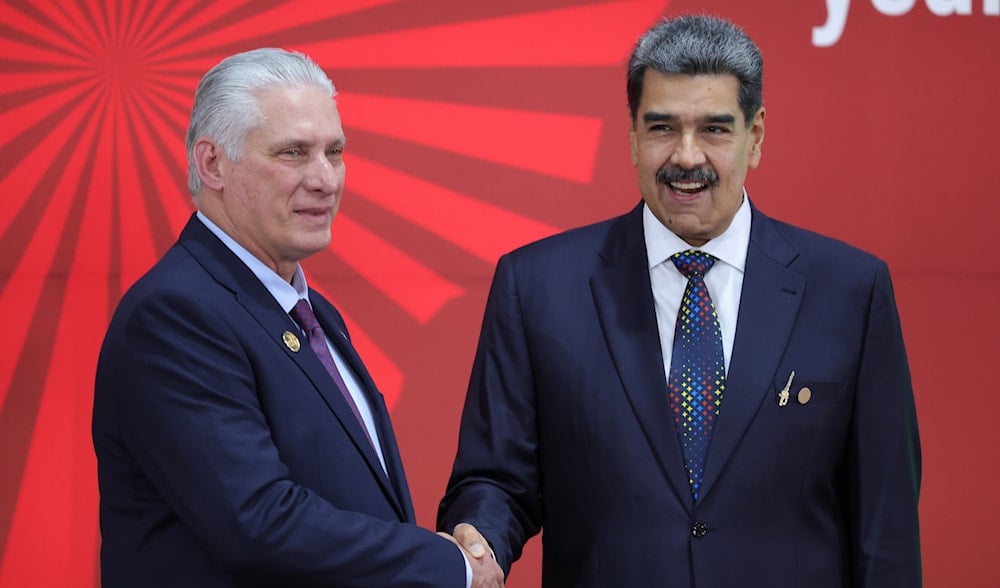US seeks to turn Caribbean into war zone amid Venezuela threats: Cuba
Cuba has strongly denounced Washington's latest military deployment as allegations target Venezuela and Latin America under the pretext of "the fight against narcotics."
-

Cuba's President Miguel Diaz Canel, left, and Venezuelan President Nicolas Maduro shake hands as they pose for photos at the start of the Bolivarian Alliance for the Peoples of Our America Summit, in Caracas, Venezuela, Dec. 14, 2024. (AP)
Cuba has strongly rejected the deployment of the United States' military forces in the Caribbean, asserting that it “threatens the region and is being carried out under absurd pretexts.”
In a statement issued by the Cuban Foreign Ministry, it affirmed that this deployment “represents a serious threat and an aggressive show of force that undermines the sovereignty and self-determination of the peoples of Latin America and the Caribbean.”
The move, according to the statement, “ignores the commitment of the 33 Member States of the Community of Latin American and Caribbean States when they proclaimed the region as a Zone of Peace.”
The ministry stressed that Washington “is not pursuing its stated goals” of fighting organized crime, illicit drug trafficking or irregular migration flows given the military assets it is allocating, which consitute a vast quantity of the troops, combat materiel, naval forces, including nuclear submarines, and firepower, stressing that such advances seek to turn the Caribbean into a war zone.
In this context, Havana reaffirmed its firm position in combatting illicit drug trafficking, defending national sovereignty, and promoting peace and stability in Latin America and the Caribbean.
Washington 'lying' to justify violence
Moreover, Cuba denounced the US allegations linking Venezuela and its president, Nicolás Maduro, to criminal organizations involved in illicit drug trafficking, asserting that they are “an absurd pretext that is unfounded."
"The Government of the United States resorts to lies once again to justify violence and plunder. They use them in the renewed implementation of the dominance scheme based on the Monroe Doctrine, key to their interventionism in the American continent," the statement further stated, recalling the aggression and humanitarian tragedies Washington created, inluding the invasion of Iraq.
Cuba also referenced a United Nations report which found that the United States is the largest market of narcotic drugs in the region and possibly the world, refuting the latter's allegations of drug trafficking across Latin America.
It added that US leaders “are irresponsibly ignoring the assessment of their own Drug Enforcement Administration,” which did not mention the Venezuelan government in its report this year as one of the parties responsible for or facilitating drug trafficking operations that threaten US territory.
The immense proceeds from the illegal US market, according to the statement, "encourage the emergence and operation of drug trafficking networks in Latin America and the Caribbean," noting that "neglect and failure to act on the root causes of the phenomenon within the United States will only intensify the regional impact of this scourge."
US, Venezuela mobilize forces as tensions rise
At least three US warships carrying more than 4,000 Marines and sailors have been dispatched into Caribbean waters under the pretext of combating drug cartels, as the US campaign has increasingly targeted Venezuela under the banner of "counternarcotics."
This came shortly after the Washington announced a 50 million bounty on Venezuelan President Nicolas Maduro.
In response, Maduro has ordered the deployment of 15,000 troops to the Colombian border in a decisive move to defend the nation against Washington's threats.
In a televised address, Maduro made clear that Venezuela would not bow to foreign pressure, declaring that the country's greatest strength lies in the collective will of its people and institutions: "a key element of national strength is the unity of the people, the army and the police."
Alongside the troops, the government has activated drones, boats, aircraft, and expanded the Bolivarian Militia, with 4.5 million members now mobilized in defense of national sovereignty.
Read more: Venezuela rallies behind president, denounces $50mln bounty on Maduro

 4 Min Read
4 Min Read










